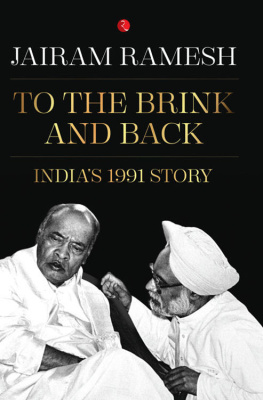Back from the Brink
Back from the Brink
Alistair Darling

First published in Great Britain in hardback and export and airside trade paperback 2011 by Atlantic Books, an imprint of Atlantic Books Ltd
Copyright Alistair Darling, 2011
The moral right of Alistair Darling to be identified as the author of this work has been asserted by him in accordance with the Copyright, Designs and Patents Act of 1988.
All rights reserved. No part of this publication may be reproduced, stored in a retrieval system, or transmitted in any form or by any means, electronic, mechanical, photocopying, recording, or otherwise, without the prior permission of both the copyright owner and the above publisher of this book.
1 2 3 4 5 6 7 8 9
A CIP catalogue record for this book is available from the British Library.
Hardback ISBN: 9 780 85789 279 9
Airport and Export Trade paperback ISBN: 9 780 85789 280 5
eBook ISBN: 9 780 85789 2829
Typeset by Richard Marston
Printed in Great Britain
Atlantic Books
Ormond House
2627 Boswell Street
London
WC1N 3JZ
www.atlantic-books.co.uk
For Calum and Anna
Contents
List of Illustrations
Acknowledgements
I am grateful to everyone who helped me write this book. Its my account and any errors are mine, for which I accept full responsibility. I would like to thank, in particular, Nick Macpherson, who was Permanent Secretary at the Treasury throughout my time as Chancellor, and through him I want to thank all the officials with whom I worked through three turbulent years. I also want to pay tribute to the high standards and professionalism of all the civil servants with whom I have worked in five Whitehall departments. Their dedication to public service is something that all of us should acknowledge.
I would also like to thank my Principal Private Secretary at the Treasury, Dan Rosenfield, and all my private office staff there for their hard work and good humour against all the odds. I have been very fortunate that in every Cabinet post I held all my private secretaries have been extremely loyal, dedicated and tolerant; for this I am very grateful.
Equally important to me has been the support of my colleagues in Parliament. Ann Coffey, MP, and before her David Hanson, MP, were my parliamentary private secretaries. Anns friendship and tolerance proved indispensable. So too was the support of many others, including Charlie Falconer, who provided a safe house on one particularly dark evening.
I particularly want to acknowledge the friendship and support of my special adviser Catherine Macleod and her husband George. Their unceasing loyalty, kindness and hospitality will never be forgotten.
I would also like to thank and acknowledge the help of my special advisers, Geoffrey Spence, who offered helpful advice on early drafts of this manuscript, and also Sam White and Torsten Henricson Bell, who were with me until the end. Special advisers are an essential part of the ministerial team. Id like to thank all of those who worked with me through my time in government.
I couldnt have discharged my ministerial duties without a strong team in my constituency in Edinburgh, so I would like to thank Isobel Forrester, Carol Wright and my agent Andrew Burns for their unstinting support.
I am also grateful to David Bradshaw, Steve Field, Lewis Neal, Faisal Islam and Anthony Measures for their help, advice and prompting in the writing of this book.
I would like to thank Toby Mundy, Margaret Stead and Orlando Whitfield at Atlantic Books for their encouragement and advice. Thanks also to my literary agents, Maggie McKernan and Georgina Capel, for their support.
Karl Burke, who drove me around the country for more than ten years and remained unfailingly cheerful, is owed another debt of gratitude. I would also like to acknowledge the support of my police protection team, who of course cant be named but who were always there and always supportive.
The camaraderie and kindness shown to us by staff in Downing Street in difficult times will not be forgotten. For providing us with respite at Dorneywood, thank you to Charlotte, Graham and Gemma.
I owe an immense debt of gratitude to all of our friends and family who gave us so much support when we needed it most. They know who they are. Thank you.
Finally, I want to acknowledge the one who has continued to provide me with everything I could ever ask for Margaret, my wife. She helped keep the show on the road and I was hugely fortunate that she chose to come and live with me in Downing Street for those three years. Without her I wouldnt have lasted the course. I want also to thank my children, Calum and Anna, who, for so much of their growing up, I was an absent presence. This book is for them.
Edinburgh, July 2011
Prologue
I dont believe in panicking before its absolutely necessary but I came close to considering it on the morning of 7 October 2008. I left Downing Street in the dark at a quarter to five on a cold, wet morning, for a routine meeting of finance ministers in Luxembourg. It was going to be a bad day, I knew that. The night before, I had met with Britains top bankers in the Treasury. They had brought with them into the room an air of desperation. An account of that meeting, only partly true, had been leaked to the BBC and the Financial Times. It was reported that Britains largest banks desperately needed money to stay afloat. Some of them needed capital which they could no longer raise from their shareholders. Crucially, it was reported, that the banks were desperate. The bankers briefing had the whiff of panic. The result was that bank shares plummeted.
We took off from RAF Northolt on a small chartered jet. A sunrise never felt so bleak. I knew the London markets were about to open and that they would react badly to the leaked news, however wrong it was. Iceland and its banking system were close to collapse and one of its banks would probably fail that day. In Ireland the day before they had, without warning, underwritten all the savings in their banks, causing disarray for everyone else in Europe. Three weeks earlier, in the United States, the collapse of Lehman Brothers, one of the countrys oldest banks, had pushed the rest of Wall Street to the edge. We were looking over the precipice. It would not take much to tip the worlds banking system and its economies over the edge. The fate of Royal Bank of Scotland or RBS, as it preferred to be known one of the worlds largest banks, was critical.
By the time I landed in Luxembourg, RBS was worth 40 per cent less than before take-off. Dealings in its shares had been suspended twice on the London Stock Exchange. My private secretary Dan Rosenfield and my special adviser Geoffrey Spence called me out of the meeting with fellow finance ministers to say that Sir Tom McKillop, the RBS chairman, needed to speak to me urgently. We cleared a room so that I could take the call. When I put down the phone, Geoffrey asked, what did he say?
He told me that his bank is going to go bust this afternoon. And he asked me what we were going to do.
For more than a year a firestorm had been gathering over the financial system in the United States and Europe. We had been singed by the warning flames a year previously, but that was a minor conflagration compared to this.

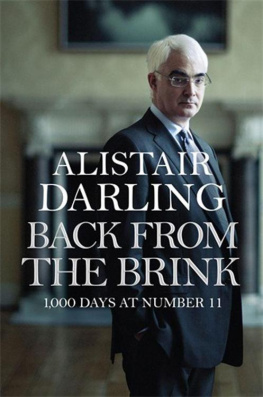
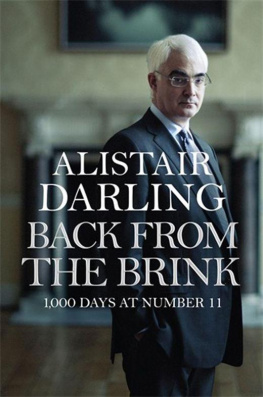
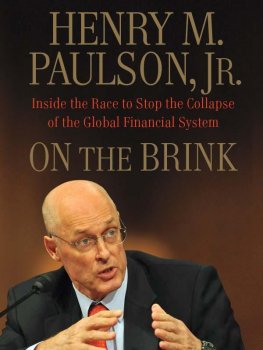
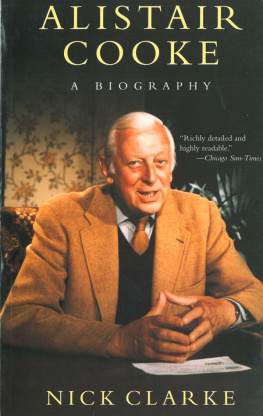

![Darling - Back from the brink: [1000 days at Number 11]](/uploads/posts/book/197393/thumbs/darling-back-from-the-brink-1000-days-at-number.jpg)
